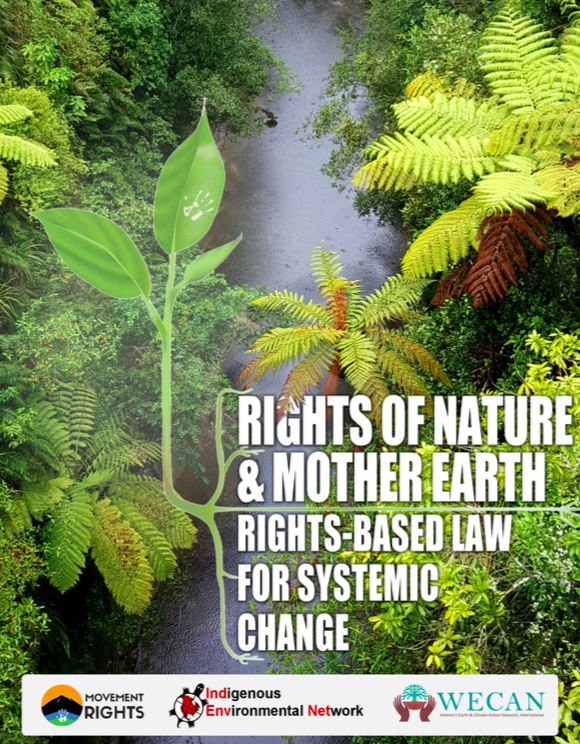
Rights-Based Law for Systemic Change
By Movement Rights, IEN & WECAN
With Contributions by Over a Dozen Rights of Nature Leaders
This report explores not just the idea of a radical shift toward recognizing rights of ecosystems (and our re- sponsibili es to the Earth) but includes global examples from around the world where these new laws are taking root. In the last year alone, New Zealand and India have recognized rivers as rights-bearing en es that now “own” themselves. They join the fast-growing list of 7 countries and dozens of local communi es that are nding the only way forward to protect human communi es is to shi our hearts, minds and legal frameworks to align with natural law. We can choose to shi now, while there is s ll me to escape the worst devasta on of climate chaos. Failing that, we must remember Mother Earth does not nego ate.
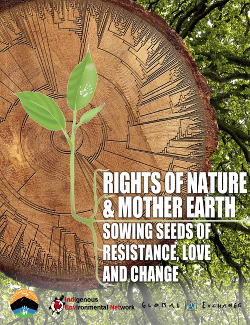
Rights of Nature & Mother Earth
By Shannon Biggs & Tom Goldtooth
The modern world is removed from nature. A world without a living knowledge of its spiritual relationship and responsibilities to the creative principles of the natural laws of Mother Earth, results in our planet become property, without a soul, to be owned and sold. Nearly everywhere, the legal paradigm of laws protects the ownership of nature, so it is not surprising that the UN climate negotiations are rooted in the continued privatization of ecosystems and putting a price tag on the processes of the natural world.

Community Rights Toolkit
By Shannon Biggs
At the heart of the Community Rights Program is the belief that asserting our right to create the kind of place we want to live and reining in corporate power is the next evolution of the civil rights movement. Over 160 communities across the United States have already asserted their right to local self-government and stopped unwanted harms. Learn how to join them!
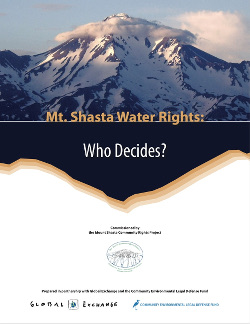
Mt. Shasta Water Rights
By Shannon Biggs & Stacey Schmader
The City of Mt. Shasta Community Water Rights and Self-Government Ordinance is about asserting our right as a community to determine how to sustainably manage our natural resources and to ensure that our local livelihoods are protected. It has no partisan agenda because the rights of human beings and nature go beyond political affiliation.
This ordinance empowers us to say “yes” to sustainable water policies and the right of the people to decide how to govern their community on those issues. It allows us to begin asserting this right by saying “no” to water bottling and cloud seeding within city limits.
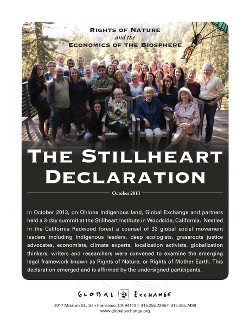
The Stillheart Declaration
As humanity fast-tracks towards the collapse of our planetary systems, we sought to articulate a shared vision toward a new economy based on living in balance with natural systems; where the rights of humans do not extend to the domination of nature. We questioned the viability of a global economy whose jurisprudence places property rights above all; recognizes corporate rights as the most sacred of property rights; subordinates human rights and the collective rights of Indigenous Peoples to corporate rights; and where Nature is not recognized as having any intrinsic rights at all.

Planting Seeds of Real Change
By Shannon Biggs
This report, “Rights of Nature: Planting the Seeds of Change,” directly challenges Rio +20’s Green Economy capitalism and examines the power and possibility and logic of a rights-based framework. Visionary thinkers such as Maude Barlow, Vandana Shiva, Thomas B.K. Goldtooth, Pablo Solon, Cormac Cullinan, Mari Margil and others ask the question: What would it look like to truly take on the root causes of climate change and put forward a system that places humankind in living balance with the carrying capacity of the Earth’s systems? If we are to truly reconnect within the system of creation, we must also reawaken our own humanity and love for Mother Earth and act as if what we do next matters. It does.
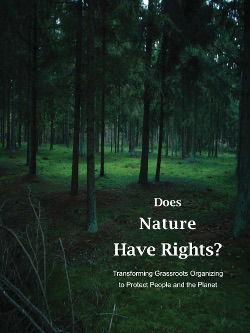
Does Nature Have Rights?
By Various Authors
Old paradigm thinking will not generate a solution. The questions before us now are: can we envisage for ourselves a future based not on exploiting nature but upon recognizing that nature has inherent rights? How different would our human societies, economies, and structures of law look as part of a connected, Earth-centered community? And, how do we get there?


